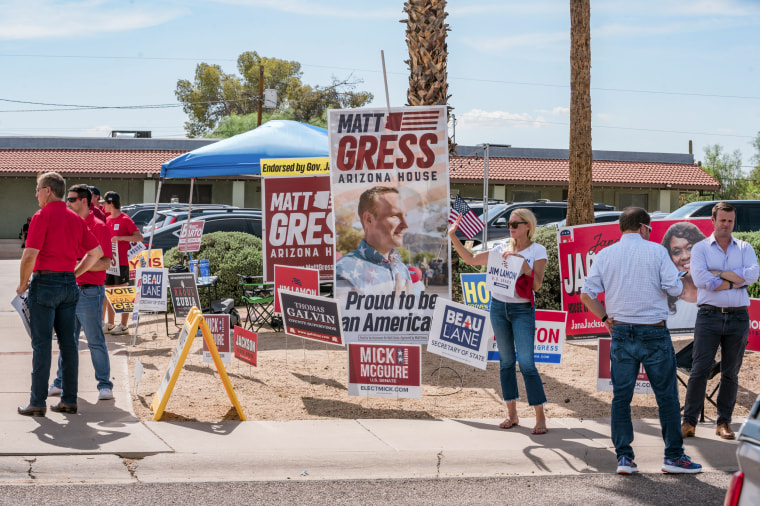Tuesday's primary elections (and pivotal constitutional amendment vote in Kansas) left us with some major takeaways — mainly that protecting abortion access can galvanize voters, and that while establishment Republicans put up a good fight, it's still the party of former President Donald Trump.
Here's a look at some of the under-the-radar numbers that helped define some of these races:
236,000
That's about how many early ballots were returned to Maricopa County on Tuesday, plus the number of in-person votes that same day, per the County Recorder (106,000 in-person, 130,000 dropped off on Election Day).
It's an important number because of the difference in how the state's top GOP gubernatorial candidates, Kari Lake and Karrin Taylor Robson, performed with early voters and those who cast (or returned) their ballots on Tuesday.
Taylor Robson had always been expected to post an early lead because the state counts early votes first, and as the establishment favorite, her base of support came from GOP voters less skeptical of early voting.
Lake's supporters appeared to be more likely to vote (or return their ballot) on Election Day after a years-long, unfounded campaign by far-right Republicans to discredit early voting. So she began to gain ground as the state started counting those newer ballots and right now sits in first place.
25,105
That's how many votes former GOP Rep. Matt Salmon has won as of noon Eastern Time in the gubernatorial race, despite dropping out and endorsing Taylor Robson last month.
With Lake and Taylor Robson separated by about 11,000 votes right, now, those votes would have been pivotal if they were cast for one of the top two candidates in the race.
$304,000
That's how much the Democratic Congressional Campaign Committee spent on ads in the GOP primary for Michigan's Third Congressional District, which featured Rep. Peter Meijer (who voted to impeach Trump) versus the Trump-backed John Gibbs who believes the 2020 election was rigged.
The decision proved controversial, with a number of House Democrats criticizing the party on the record for attempting to boost an election-denying Republican over a more moderate member (the DCCC maintains its main goal is putting the party in the best position to win the seat).
Ultimately, Gibbs is poised to win by a single-digit margin.
$12.4 million
That's how much was spent on the ad airwaves in Kansas' pivotal proposed state constitutional amendment that would have undercut abortion protections in the state, per the ad-tracking firm AdImpact.
The spending was spit about 50/50 between the two sides — a yes vote would have added language to the state constitution that clarified it did not secure a right to abortion access, while a no vote kept the status quo after the state Supreme Court ruled in 2019 that the constitution did secure a right to abortion access.
Opponents framed the push as a “slippery slope” that could lead to abortion bans without any incest/rape/mother’s life exceptions and give the government more ability to infringe on privacy. They also argued that the current laws are already robust and ran an ad evoking Covid mandates to argue that “Kansans don’t want another government mandate.”
And supporters of the so-called “Value Them Both” amendment argue that the amendment itself doesn’t ban anything, and that it gives the legislature the power to make “common-sense” limits on abortion moving forward.
$15 million
That's how much billionaire Peter Thiel gave as of July 13 to a super PAC backing Blake Masters, the Thiel confidante who won Tuesday's GOP Senate primary in Arizona.
$6.7 million
That's how much Senate Leadership Fund, a super PAC aligned with Senate Republican Leader Mitch McConnell, gave to a group that attacked disgraced former Gov. Eric Greitens on the airwaves, as first reported by Politico.
$118,000
That's how much Michigan Republican gubernatorial nominee Tudor Dixon spent on ads in her primary race, per AdImpact. But while Dixon's top opponent, businessman Kevin Rinke, spent almost $5.8 million on ads and Democrats spent big to criticize her, Dixon won thanks in part to backing from Trump and big outside spending from her own allies.
$3.8 million
That's how much United Democracy Project, an outside group affiliated with the pro-Israel AIPAC, spent to boost Michigan Democratic Rep. Hayley Stevens in her member-on-member primary, per AdImpact. The spending proved to be one of the flash points in the race, which Stevens ultimately won.
$3.5 million
That's how much two outside groups — Winning for Women and Defending Main Street — spent to protect two Washington Republican members of Congress who voted to impeach Trump, Jaime Herrera Beutler and Dan Newhouse respectively. Winning for Women spent at least $2.3 million to boost the former and Defending Main Street $1.2 million to boost the latter, per the latest Federal Election Commission filings.
Neither race has been called yet by NBC's Decision Desk, but both incumbents currently sit in the top-two slots of their primary (which pits all the candidates against each other, with the top two candidates, regardless of party, moving on to a general election).

